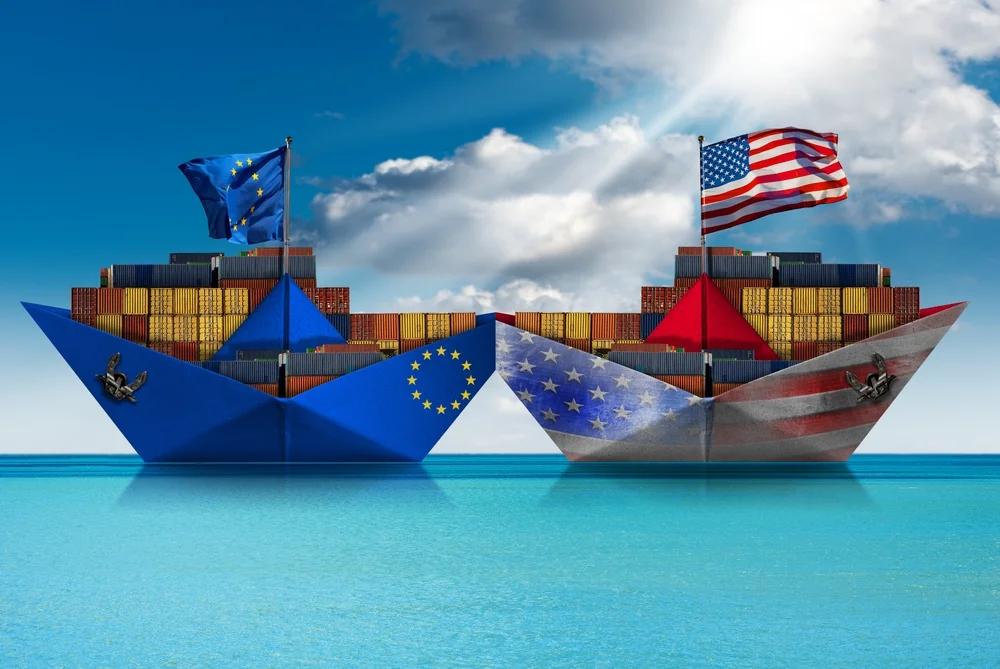
Transatlantic Trade War Produces No Winners
The Trump Tariff and the EU antitrust vendetta against Apple and Google should both end now.
It is hard to overestimate the massive economic dislocation tied to Donald Trump's return to the White House barely two months ago. Trump’s unforced errors include his nonstop trade wars against virtually all of our one-time trading partners, who are now pelted with on-again / off-again tariff threats driven by Trump’s risky America First rhetoric, which he claims is supported by the economic successes of his first administration, and on which he now wishes to double down. But the successes of his first administration stemmed in large part from working to increase overall trade, as evidenced by the steady increase in the S&P 500 during his first term, in contrast to the sharp decline of that index in the opening months of his second term—five percent up in 2017 is better than five percent down in 2025. (Hint: when he hints of a tariff pause, the market immediately knocks twenty five percent off that loss.) Trump would laugh if Joe Biden had justified his various destructive economic moves on the ground that a short-term recession is needed to shake things up. So now he rightly has to take it on the chin as his left-wing critics rejoice in his no-win maneuvers. America First is a chimera for domestic consumption whose true cost includes the loss of goodwill worldwide and the imposition of trade countermeasures that, like Trump’s tariff feints, only intensify needless antagonisms. There are no hidden collateral political benefits in global diplomacy to soften the blow. Indeed, if the harmful economic consequences come home to roost, his strongest supporters may desert him because he fails to deliver on pocketbook issues.
Trump’s ingrained economic confusion, coupled with his misguided preoccupation with annual trade deficits, leads him to overlook the fact that the surplus dollars remaining in the United States are invested in productive assets that benefit the world. Moreover, his current fixation only inspires other nations to launch their retaliatory trade missiles in our direction, to the detriment of both sides. All of this is not to say that some targeted responses, most notably against China for its insistent theft of American intellectual property, are unjustified, but it is inane to claim that the exclusion of European steel is justified on grounds of national security, or that the importation of deadly fentanyl from overseas dominates the American market when local production is rife, and the overall death levels from drug-related incidents are down about twenty four percent in the last year.
It is, therefore, tragic that the misguided economic masterminds of the European Commission have initiated a massive attack against Apple and Google for their supposed violations of the EU Digital Markets Act (DMA). To hear the elders of the EU describe it, the DMA is all gain and no pain for the EU and, indeed, the world. Thus, their opening salvo predicts all gain and no pain, as the DMA “establishes a set of clearly defined objective criteria to qualify a large online platform as a ‘gatekeeper’ and ensures that they behave in a fair way online and leave room for contestability.” These gatekeepers include online search engines and app stores because it is through all these portals that lesser mortals can enter the digital space to market their wares. And contestability is the state of affairs where new entrants are in an easy position to take on established rivals so as to increase the number of competitors in any easy space.
Taken in the abstract, this last ideal seems attractive, but one of the less-noticed features of this definition is that it requires that “all firms, both incumbent and potential entrants, have access to the same production technology,” and it is there that the rubber hits the road. The only way in which there can be parity in the downstream market is to grant massive subsidies to new entrants in the downstream markets from the incumbents who built their technology in the upstream market. The EC’s rules insist that the incumbents owe powerful obligations to all newcomers, which could easily cost billions of dollars (or Euros) to discharge.
The EC “preliminary view” is that no company may give any preference to its own products in their placement on the search engine over any of their third-party rivals, given its obligation to treat these rivals in a “transparent, fair and nondiscriminatory way.” There is little reason to think that this “preliminary view” will change after protracted litigation, since the EU regards that obligation as “one of the centrepieces of the European digital strategy.” What is striking about the EU’s view on this, and indeed, every other issue it examines, is that firms like Apple and Google cannot offer any legitimate social reason to question that strict obligation. But the “rule of reason” approach to antitrust should apply when there are serious arguments in favor of the project, which, in this case, there are. The per se rule works best when there is only one player in a market who offers no efficiency gains for its restrictive practices. But in this case, there are both the two major players and other small players who could gain an advantage if Google or Apple (who are also in competition with each other) should falter.
In addition, there are tradeoffs that the EU does not acknowledge. Thus, there is no question that if, as the Commission rightly asserts, there are advantages to superior placement, these will be lost by Apple and Google if they are transferred gratis to third-parties. That reduction in return will lead both Google and Apple to slow down their rate of innovation given the reduction of return so at the very least, the EU should try to estimate the importance of that delay, as everyone suffers from slower innovation. It could well be that some outsiders would prefer more rapid innovation by relying on two counterstrategies. First, pay for preferred placement when needed, such as to launch a new product. Alternatively, rely on the simple point that skilled users may well scroll down to the second page before making their purchase decisions.
The second condition is riskier, for it is one thing for Apple or Google to license their interfaces to the right parties for the right prices. But it is a very different thing to force them to license these valuable assets to multiple competitors who make different kinds of phones—again, apparently at zero price. At the very least, this counts as a huge cross-subsidy to competitors, which, under the American law established in Verizon v. Trinko (2004) is that, except in exceedingly rare circumstances, no company is under a duty to do business with a competitor, let alone for zero price. The number of demanders could be large, and they could easily ask for trade secret information, which they don’t use to interconnect, but only for other purposes. Thus, the EU uses its power to force a form of misappropriation of intellectual property from one company to another, which is a form of unfair competition under the important American decision in International News Service v Associated Press (1918). Nor is there any reason why services like Google Play should be required to aid its rivals in establishing their customer base using Google’s information.
Not one word of these complications has been addressed by the EU. Yet, with a case so flimsy, it decides to lower the boom on Google and Apple with potential financial penalties that could, under the DMA, justify fines of ten percent of worldwide revenue for first offenders and twenty percent of revenues for repeat violators, —a sizable chunk for Apple whose worldwide revenues are $391 billion. There is hardly clarity given the amount of discretion that the European Commission reserves for itself. And it is downright scandalous to use a worldwide baseline for anything, including revenues earned by activities occurring within countries outside the EU. There was a famous statement by Lord Ellenborough in Buchanan v. Rucker (1808) who asked whether the courts of Tobago can bind the world over a title dispute to land in Tobago, where the defendant was not personally served.
Sadly, the EC’s problem is not simply failing to give notice to potential defendants. It is presuming to bully foreign corporations by an abuse of its competitions policy, when, given the multiple failures of its heavy-handed policies, it has managed to make a mess of virtually every domestic policy that has international obligations, including its key rules on licensing of standard essential patents (used to set industry standards for network industries and compulsory licensing terms). These receive rave reviews from pollyannish EU leaders, most notably Thierry Breton, former Commissioner for the Internal Market, who overclaimed in familiar words that “their solid patent framework will empower economic operators and competent authorities to better protect innovation while ensuring fair access, including during emergency situations.” Meanwhile, patent experts from the United States, Great Britain, and Europe disparage the endless delays, obscure standards, and abuse of discretion and ask out loud why the EU has no tech industry. These developments have not escaped Trump’s attention because they allow him to justify his tariffs on the EU as a response to the EU’s unprincipled economic aggrandizement. Dumb following dumb is truly stupid. The EU should end its competitions policy vendetta. Trump should drop his tariffs. Two simple actions, taken together, could restore some semblance of sanity to the world.
Richard A. Epstein is a senior research fellow at the Civitas Institute. He is also the inaugural Laurence A. Tisch Professor of Law at NYU School of Law, where he serves as a Director of the Classical Liberal Institute, which he helped found in 2013. He has served as the Peter and Kirstin Bedford Senior Fellow (adjunct) at the Hoover Institution since 2000. Epstein is also the James Parker Hall Distinguished Service Professor of Law Emeritus and a senior lecturer at the University of Chicago.
Economic Dynamism

The American Dream Is Not a Coin Flip, and Wages Have Not Stagnated
This paper challenges the prevailing narrative that stagnant wages are causing the American dream to fade. It contrasts subjective public opinion with revised objective intergenerational mobility measures.

Political Economy and the Rise of Commercial Humanism
Western attitudes toward commerce have transformed from early moral condemnation to a modern appreciation that sees trade as socially beneficial.
.webp)
Congress Must Shield US Companies from European Regulations
Congress should exercise its constitutional powers over foreign commerce to guard American companies against overregulation by the European Union.
.webp)
ESG Would Rain on Spring Break
Americans have access to abundant, reliable energy, unlike Europeans under strict climate mandates.
.png)

_(7184104335).webp)




.webp)



.webp)




